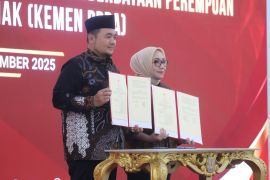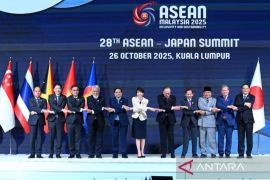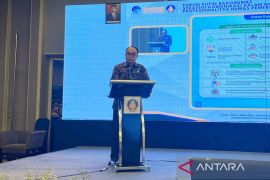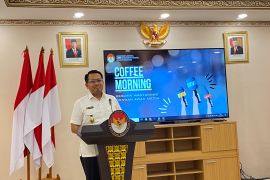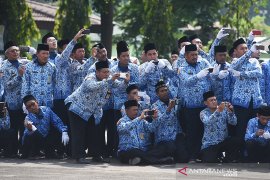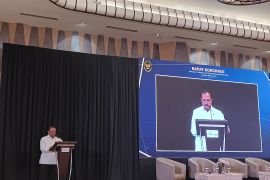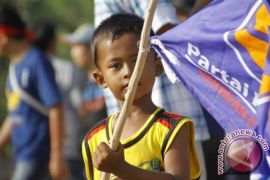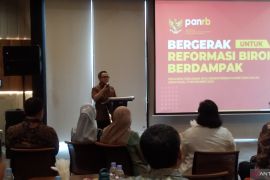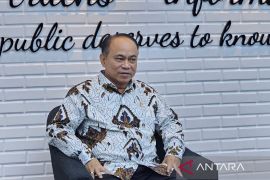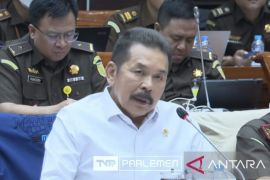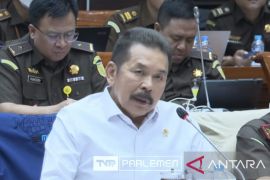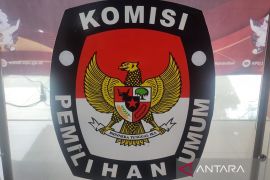Many legislators, ministers and even the President are in favour of having simultaneous elections in 2019 in light of the fact that the new method would save time, reduce costs and spare voters the trouble of going to the polls too often.
Most agree that national and local elections should be held simultaneously in 2019, but there is also suggestion that the national legislative and presidential elections should be held simultaneously in 2014.
Since Indonesia has direct presidential elections, the legislative and presidential elections have been organized sequentially. These two elections are held separately from the regional elections, which follow a different schedule.
The Indonesian Democratic Party of Struggle (PDIP) faction in the House of Representatives (DPR) has already drafted a plan on conducting simultaneous elections.
"Based on the plan, the simultaneous elections should only be held twice in five years. One will be a national election for president to be held simultaneously with the election of members of DPR, members of Local Legislative Assembly (DPRD), and members of Regional Representative Council (DPD). The other will be a simultaneous election for regional heads (Pilkada). And the members of each institution will have a five year term of office," PDIP member Arif explained.
He stated that simultaneous national and local elections could not be conducted before 2019 "because a lot of preparation is needed, including revision of Law No. 42/2008 on the presidential election".
"Currently, the House of Representatives (DPR) is taking the initiative to amend the law. We are providing inputs on how to develop an effective and stable government," Arif said during a meeting on simultaneous elections, held here on Friday.
The national and local elections can be held simultaneously in 2019 only if the law on presidential election can be revised by the end of this year.
Arif said there would be a lot of debate before a framework to conduct simultaneous local and national elections could be finalized.
"However, it is possible to organize simultaneous legislative and presidential elections in 2014. We still have 18 months to prepare for such an election," he pointed out.
"Simultaneous local and national elections cannot be held before 2019 because time is needed to carry out a transition in the regional government leadership and to do other adjustments," Arif added.
Meanwhile, his colleague Ganjar Pranowo, the deputy chairman of the House of Representatives` Commission II on home affairs, said it would be difficult to conduct simultaneous presidential and legislative elections in 2014.
"The possibility of having a presidential election and legislative elections simultaneously this time is very small. Only the PDIP was open to the idea; other factions in the House did not respond to it," he noted.
Ganjar explained that simultaneous elections cannot be possibly carried out in 2014 because the House and the government did not have the time to amend the presidential election law.
However, he acknowledged that simultaneous presidential and legislative elections would save time and money and also help organisers manage the elections more efficiently.
Therefore, Ganjar added, a simultaneous presidential and legislative election "could lead to more structured and systematic elections".
Home affairs minister Gamawan Fauzi said President Susilo Bambang Yudhoyono was in favour of simultaneous regional elections.
"I have reported to him about it. He agreed and asked me to regulate it. Actually, the President is all for the idea if it improves efficiency," he said at the presidential palace last month.
He stated that combining the elections of provincial governors, district heads and mayors would not only save time and money but also "improve the quality of the elections".
"Every two days we hear about elections of district heads here and there. It seems the country has elections all the time," Gamawan pointed out.
However, the minister said his office was still examining the feasibility of simultaneous elections system and would discuss the draft law on elections at the parliament.
Meanwhile, General Elections Commission (KPU) member Hadar Nafis Gumay stated that simultaneous national and local elections would help organizers better manage the elections.
"The organizers can manage the elections more efficiently and effectively if they are held at the same time," he said during a meeting on simultaneous elections, held here on Friday.
"The KPU could focus their attention on providing comprehensive guidance and directives and thereby organize the elections in a better way if they are held at the same time," Hadar added.
He said the KPU was of the view that a legal framework should first be developed in order to pave the way for simultaneous elections.
As the organizer, the KPU will just follow the law, Hadar explained.
"There are two models of simultaneous elections that may be implemented - the first being simultaneous legislative and presidential elections and the second being simultaneous local government head elections," Hadar went on.
"Thus, in five years, there will be only two elections, namely the national elections and the local government elections," he pointed out. (*)
(A014/INE/a014)
Reporter: Andi Abdussalam
Editor: Fardah Assegaf
Copyright © ANTARA 2012
